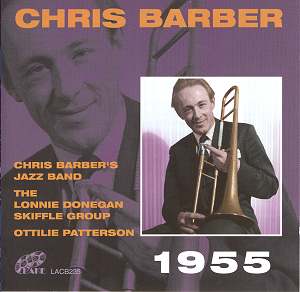You Don't Understand
Tishomingo Blues
Wild Cat Blues
Everybody Loves My Baby
Papa De Da Da
High Society
Trouble In Mind
Jailhouse Blues
Doin' The Crazy Walk
Baby
Magnolia's Wedding Day
Dixie Cinderella
Here Comes My Blackbird
Can't We Get Together
Sweet Savannah Sue
Porgy
Diga Diga Do
Harmonica Blues
Worried Man Blues
Blue In Wood Green
My Bucket's Got A Hole In It
Lord, Lord, Lord
Blues Is Knocking On My Door
Momma Don't Allow
In a curious programmatic
arc this recital of the Barber band
in 1955 goes from Traditional to Skiffle
and ends with the Revival. The first
seventeen tracks are some fine examples
of Barber’s post-Colyer band caught
in the studios; there are two sides
from Lonnie Donegan’s Skiffle Group
and then the disc ends with the down
home preaching of the band in the lo-fi
soundtrack to the film Momma Don’t
Allow, never before released.
It implies a fluidity to the band’s
stylistic horizons that is clearly born
out in practice. And it also shows the
kind of versatility of which the band
was also capable – and thoroughly proficient
in recreating.
Taken from commercial
recordings of the time we have here
examples of LPs that celebrated Clarence
and Spencer Williams and a Jazz Today
LP called Echoes of Harlem
that included songs by Andy Razaf, Fats
Waller, Fields and McHugh and the like.
The band had emerged
from its vicissitudes with clarity and
determination. There’s that typically
light, springy rhythm and the crisp,
clean front line. Tishomingo Blues
in fact emerges as even springier than
it might, which argues for limits on
this kind of approach, but the corollary
is the high level of expertise on display.
Monty Sunshine’s feature Wild Cat
Blues sounds highly rehearsed indeed.
Ottilie Patterson adds some Bessie Smith
gravitas on her appearances – she’s
especially convincing on Jailhouse
Blues - and collector-discographers
should note that her Trouble in Mind
is from a previously unissued acetate.
Things like Doin'
The Crazy Walk show the catholicity
and adventurousness of their repertoire
– they were not at all dogmatic even
then. And the influence of the de Paris
brothers is clear as well; Barber has
gone on record in acknowledging his
debt to Wilbur de Paris, a now half
forgotten stylist whose playing was
always exciting and life affirming.
Maybe Barber also echoes Jimmy Archey
in Here Comes My Blackbird. He
takes an elegant solo on Porgy.
Pat Halcox of course is a tower of strength
throughout.
The Skiffle sides are
not the kind that Barber and Sunshine’s
erstwhile colleague Ken Colyer recorded;
Barber and Donegan avoid Leadbelly here,
though doubtless they like Colyer knew
his recordings, preferring Sonny Terry
and Brownie McGhee instead, a stylistic
decision that Barber for one has maintained
for half a century now. The film
soundtrack is a bit rough and ready
but shows us the more Back to the Delta
side of the band. Here Bunk Johnson,
George Lewis and Jim Robinson are very
clearly the models.
So a curious arc inasmuch
as it seems completely unhistorical
to end with the revivalist world that
Barber and co. had just left. Of course
at the time things weren’t quite so,
well, Academic. For admirers this release,
a sort of "Year in the Life"
album, joins Lake’s other Barber discs
in usefulness and enjoyment.
Jonathan Woolf
